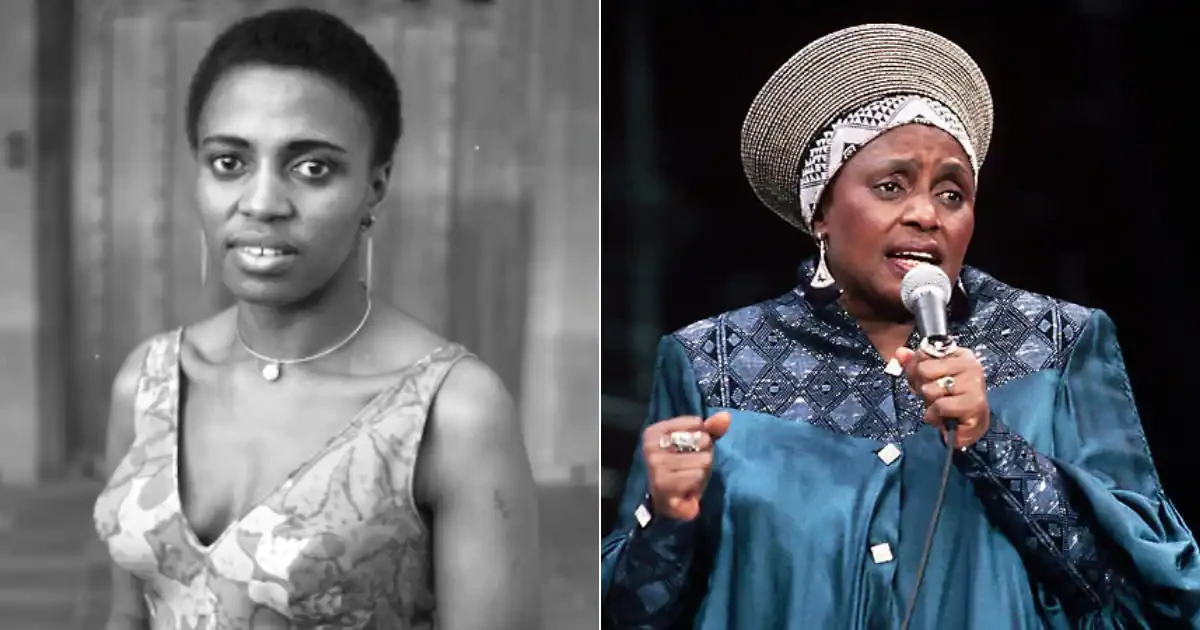Miriam Makeba is one of the few who used music as a weapon to fight injustice and birthed a more equitable society.

Few voices have contributed to history and birthed a just society like Miriam Makeba.
This South African singer, songwriter, and activist rose to international prominence, becoming known as "Mama Africa."
But how did this nickname come about? It wasn't just a catchy phrase; it reflected Makeba's immense contribution to putting African music on the map and her relentless advocacy for the continent.
Summary
- Miriam Makeba, also known as Mama Africa, was a South African singer, songwriter, and civil rights activist.
- She put African music on the map and used her music to fight against apartheid in South Africa.
- Her songs inspired the anti-apartheid movement, inspiring millions in their fight for freedom.
- She is remembered as a powerful voice for justice and a testament to the power of music to bring about change.
Miriam Makeba’s Early Life and Influences
Born in 1932, Miriam Makeba's journey began in Sophiatown, a Johannesburg township. Though full of life despite the harsh reality of segregation. Growing up here, Makeba couldn't escape the racial realities of apartheid South Africa.
South Africa during Makeba's childhood (1930s-1940s) was a nation entrenched in racial discrimination. Apartheid policies were tightening their grip and limiting opportunities and freedoms for Black South Africans. Witnessing this injustice at a young age likely instilled in Makeba a strong sense of social consciousness and a yearning for a more equitable society.
Music was like a family thing for her. Her Swazi mother played various instruments, and her brother collected records by African American artists like Duke Ellington and Ella Fitzgerald for her to listen to. Her father, who played piano for a group of musicians, shaped her interest in music.
Captivated by these sounds, Makeba learned songs and honed her own vocal talents. School, too, played a role. Singing in church choirs, she embraced a diverse repertoire in English, Xhosa, Sotho, and Zulu, demonstrating her early exposure to the richness of South African music.
These experiences in Sophiatown, along with the social and political realities of the time, became the foundation for Miriam Makeba's powerful voice. This voice would sing of her love for her homeland and challenge the injustices she witnessed.
Miriam Makeba Rise to Stardom
Miriam Makeba's early career blossomed in the 1950s, a time of racial segregation and the tightening grip of apartheid.
Makeba joined the popular all-female group, The Skylarks. This group gained recognition for their blend of jazz and African melodies, captivating audiences across South Africa. Makeba's powerful vocals and stage presence further propelled her to stardom. Collaborations with another renowned South African group, the Manhattan Brothers, solidified her position as a leading voice in the country's music scene.
Makeba's music wasn't just about captivating melodies. Her lyrics often reflected the struggles of Black South Africans living under apartheid. Songs like "Pata Pata(1967) and Lumumba(1970)" showcased the beauty and resilience of her culture, while others carried a subtle undercurrent of resistance against the oppressive regime.
Makeba’s Activism Journey
Miriam Makeba's powerful voice wasn't just for singing beautiful melodies; it became a weapon against the brutality of apartheid in South Africa. She transformed her music into a platform for activism, using her international fame to shine a spotlight on the injustices faced by Black South Africans.
Makeba's music wasn't always overtly political. Early hits like the infectious "Pata Pata" captured the spirit of joy and resilience that apartheid couldn't extinguish. However, the song held a hidden layer of defiance. "Pata Pata" translates to "touch, touch" and could be seen not just as a reference to a dance, but also a subtle jab at the draconian "pass laws" that restricted the movement of Black South Africans.
As Makeba's awareness of the regime's brutality grew, so did the political content in her music. Songs like "Soweto Blues," written by her ex-husband Hugh Masekela, directly addressed the horrors of the Soweto Uprising. "Ndodemnyama we Verwoerd" (Beware, Verwoerd) was a scathing critique of the then-Prime Minister of South Africa, Hendrik Verwoerd, and his apartheid policies.
Makeba's music wasn't just about criticizing the South African government; it also became a platform for those fighting for freedom. Songs like "Malaika" (Angel) spoke of a longing for a better future, a future free from racial oppression.
By employing activism into her music, Miriam Makeba ensured that the message of the anti-apartheid movement reached a global audience. Her songs became anthems for the struggle, inspiring generations of freedom fighters not just in South Africa, but across the world.
Miriam Makeba’s Personal life
While Miriam Makeba achieved international acclaim, her personal life, particularly her marriages, faced challenges.
Her marriage to John Kubay, a trained policeman, happened in 1949 when she was 17 years old.
The union was blessed with Makeba’s one and only child, Sibongile Makeba, however in 1950, Makeba was diagnosed with breast cancer and her husband left her shortly after, though she survived the cancer.
There is no harm in trying, they say. This could be why Makeba gave love a second trial with Hugh Masekela, a trumpeter, in 1964. It lasted for just two years before they parted.
Makeba's resilience is evident not only in her fight for justice but also in her marriage. This saying falls in line with her trial with the third man she was married to, Stokely Carmichael, a militant African-American civil rights activist and Black Panther leader, in 1968.
The affair hit the rock in 1973, individually going their separate ways.
Makeba's marriages likely ended due to an interplay of factors, not simply a lack of love. Her dedication to music and activism may not have been easily balanced with traditional married life.
Miriam Makeba's Songs and their themes
Miriam Makeba wasn't just a powerful singer; she was a musical warrior against the brutal system of apartheid in South Africa. But how exactly did she fight with the song? Let's consider the themes of her music and see how they resonated with the anti-apartheid movement.
Many of Makeba's songs painted a vivid picture of life under apartheid. Tracks like "Pata Pata" 1967) and "The Click Song" 1963) weren't just catchy tunes; they were infused with the joy and spirit of her people, even in the face of oppression. This defiance was a powerful message – even under a hateful regime, their culture and spirit couldn't be crushed.
Also, Songs like "Malaika" spoke of the pain of exile, forced upon her by the apartheid government. This resonated with the millions who were separated from loved ones due to the regime's policies. It wasn't just a personal story but a story shared by countless others.
Some of Makeba's songs became anthems for the anti-apartheid movement. "A-Ye!'' (meaning "Forward!") was a rallying cry for change, urging people to fight for their freedom. And then there was "Soweto Blues"(1977), a song about the Soweto Uprising, a moment in the struggle. Makeba, who wasn't the original singer of this song but performed it powerfully, gave voice to the anger and grief felt by millions over the student massacre.
Makeba wasn't just singing songs—she was telling the stories of her people, their struggles, and their hope for a better future.
Makeba’s Legacy
Makeba's music wasn't just entertainment, it was a weapon. She sang about the struggles of Black South Africans and the injustice of apartheid.
Her powerful voice became a symbol of resistance, inspiring millions fighting for freedom around the globe. This fight even earned her a Grammy Award in 1985, a huge achievement for any artist, but even more significant for an exiled artist fighting for her homeland.
Makeba wasn't content just singing about social justice; she actively fought for it. She became a delegate to the United Nations, using her platform to advocate for human rights and equality. Even as a celebrated musician, she never forgot the cause that fueled her music.
The fight against apartheid eventually led to Nelson Mandela's release and the dismantling of the racist regime. In a decisive moment of reconciliation, Mandela himself invited Makeba back to South Africa to perform. This was a triumphant homecoming for the woman whose voice had been a source of hope for her nation throughout her exile.
Makeba's journey wasn't a solo act. Collaborating with other talented musicians like Harry Belafonte and Paul Simon helped amplify her message and expose her music to even wider audiences. These collaborations weren't just about sharing stages; they were friendships built on a shared passion for justice and the power of music.
Final Thoughts
Miriam Makeba’s journey began in the segregated townships of South Africa, where she witnessed the injustices of apartheid firsthand. This experience made her music, transforming it into a weapon against oppression.
She wasn't content to just sing, though. Makeba became a UN delegate, actively fighting for human rights. Her commitment to justice earned her a Grammy Award and a triumphant return to a free South Africa.
Miriam Makeba's legacy is a powerful reminder that music can be a force for good. Her story concerns courage, resilience, and the constant belief in a better future.

